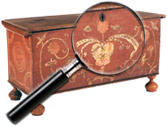Sleuth, a film by by Joseph L. Manciewicz
Courtesy of Skinner, Inc
Based on Anthony Schaffer’s screenplay, the original version of Sleuth (1972) is a two-handed thriller, starring Sir Laurence Olivier and Michael Caine, that plays on the conventions of the traditional English “Whodunnit” made famous by authors such as Agatha Christie and Dorothy L. Sayers.
The film is set in Cloke Manor, the rambling country residence of a detective fiction writer, Sir Andrew Whyke (Olivier), whose wife Marguerite is proposing to leave him for fashionable hairdresser, Milo Tindle (Caine). Sir Andrew’s disdain for Milo’s working class family, and Milo’s resentment of Sir Andrew, sets the scene for a complex plot involving game playing, sportsmanship and murder. Sir Andrew invites Tindle to Cloke Manor under the pretext of securing a divorce from Marguerite, and then proposes that his adversary stage a jewelry theft for their mutual benefit; Milo can sell the jewels to pay for Marguerite’s lifestyle, while Sir Andrew claims the insurance money. In a series of elaborate transformations, Tindle, disguised as a clown, is shot by Sir Andrew. But is he really dead? The mysterious Inspector Doppler arrives to investigate, but it is soon revealed that he has games of his own in mind.
The themes of play and puzzles are reflected by Sir Andrew’s books and the furnishings of his home; fortune telling machines, toys and automata line the walls of the manor. Many of the automata used in the film were provided by the English collector, Grace Thomson, and it is her contribution of acrobats, clowns and musicians that lends the film its unsettling circus like atmosphere. However, their role in the film is not only one of props; they act as amused spectators to the unfolding action, occasionally lending their persons for the concealment of clues.
The two automata here (Laughing Sailor D9719579 and Magician at TableD9719583) play an active role in the film, none more so than “Jolly Jack Tar”, a life-sized laughing sailor who enjoys a symbiotic relationship with Sir Andrew. Sir Andrew makes the jokes and Jolly Jack laughs at them. Towards the end of the film, Jack’s right eye is used to conceal the false eyelashes of Sir Andrew’s murdered mistress. The automaton’s unusual behavior (winking instead of blinking at Whyke) eventually leads its owner to their recovery. The Indian Magician also appears at appropriate moments, including the final sequence, waving his wand and mumbling as he peers from side to side. The film reaches its dramatic denouement with the death of one of the two leads who falls clutching the remote control to the automata, setting them all off at once, while Jolly Jack laughs uncontrollably at the confusion.
Sleuth was the final film directed by Joseph L. Manciewicz, with a music score by John Addison. The remarkable set was designed by Ken Adam, who’s other credits number Stanley Kubrick’s Dr. Strangelove, and the futuristic scenery of some of the most iconic James Bond sets, including Dr. No and Gold Finger. The film was nominated for Academy Awards for best actor for both of its leads, best director, and best musical score. Olivier won the New York Film Critics Award for his role. A remake directed by Kenneth Brannagh, starring Michael Caine, this time in the role of Whyke and Jude Law as Tindle was released in 2007.
